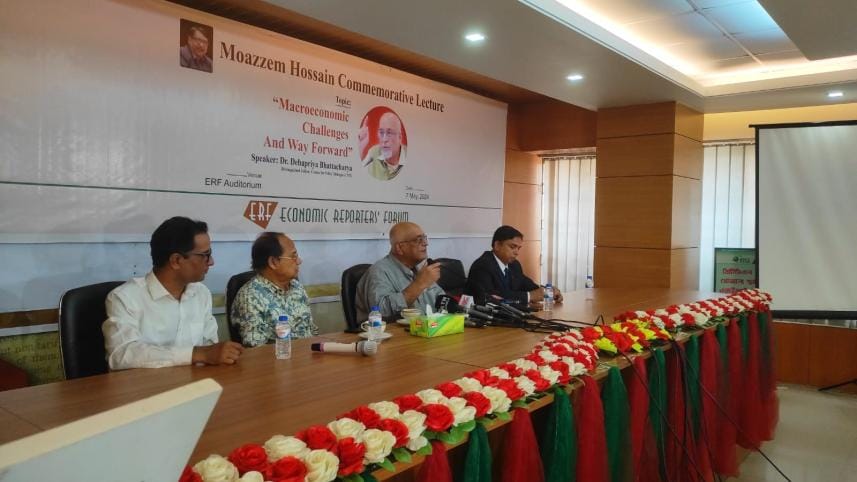Economic crisis may deepen in 2026: Debapriya

The economic crisis in Bangladesh may deepen in 2026 as the government will have to shell out large sums for foreign debt management and to repay loans borrowed from local banks, a noted economist said yesterday.
Debapriya Bhattacharya, a distinguished fellow at the Centre for Policy Dialogue (CPD), earlier had predicted that the country would be in trouble in 2024 for an increase in loan repayments by the government.
And that has materialised as, in the July-March period of this fiscal year, Bangladesh's foreign debt servicing surged by 49 percent year-on-year, as per the Economic Relations Division.
This was driven by spiralling interest payments, which crossed the $1 billion mark for the first time.
Similarly, the country will face a severe crisis in 2026 as the government has availed a significant amount of loans from foreign lending agencies and local banks which it will have to repay, said Bhattacharya.
As of December 2023, Bangladesh's external debt stood at $79.6 billion. This figure was approximately 13.7 percent of the nation's gross domestic product of fiscal year 2022-23.
Bhattacharya added that private sector loans from foreign sources would push up the total external debt even higher.
Of the total borrowing, 20 percent is foreign debt, and more than twice that has been taken either from local banks or by printing money, he added.
He also reminded that such loans would need to be repaid in US dollars, which have been in short supply in Bangladesh in recent times.
Bhattacharya was speaking at the first Moazzem Hossain commemorative lecture on "macroeconomic challenges and way forward" organised by Economic Reporters' Forum (ERF) at its office in Dhaka.
Bangladesh used to boast about never having failed to repay loans in a timely manner, but that point of pride had been compromised when the country could not timely pay a $5 billion import bill for petroleum, said Bhattacharya.
Moreover, foreign investors cannot repatriate profits due to the shortage of US dollars in the banking system and many foreign airlines cannot take back their earnings from ticket sales due to the dollar crisis, he said.
He added that all such information used to come to the media from Bangladesh Bank, where journalists used to regularly go. This is why journalists were recently restricted from entering the central bank, he said.
The central bank's restrictive measures have raised suspicions, said Bhattacharya, adding that the move was pre-emptive and in conflict with the government's vision for a "Smart Bangladesh".
Commenting on economic growth, he said although it has gradually started slowing down, the country's estimates do not match up with the major factors that should play a role.
For instance, the current economic growth cannot be attributed to the inflow of investments and loans or import of capital goods. Yet, economic growth is taking place, he said.
Moreover, it is not yielding any additional income tax, he said.
Bhattacharya explained that this economic growth could be fostered solely by state investment in lieu of little private investment, which he likened to a plane operating with just one functioning engine.
He also pointed out that the economic growth has not improved the tax-GDP ratio and such growth would not lead to more money being allocated to the education and health sectors.
He also opined that overpriced mega projects would be a trap for Bangladesh.
Bhattacharya suggested the government give more facilities to cottage, micro, small and medium enterprises, especially those in rural areas.
He also suggested the continuation of subsidies to some extent, as well as improving food security by increasing the number of silos and increasing food stocks.
For greater transparency, he proposed making public the names of the three crore beneficiaries of the government's Open Market Sales (OMS) programme, through which some essential food commodities are sold at a subsidised rate.
He also urged the government to expand the coverage of the OMS programme up to the upazila level.
This is because many lower middle-income people are now registering for the OMS programme and are standing in queues to buy low-cost food, Bhattacharya also said.
He also suggested reducing the bank interest rate and emphasised keeping the policy and fiscal policies consistent.
"Who will take responsibility for defaulted loans if banks are merged? Or will Bangladesh Bank waive the defaulted loans?" he asked.
Shamsul Huq Zahid, editor of the Financial Express, also spoke, commemorating Moazzem Hossain, the founding editor of the English daily and founding president of the ERF.



 For all latest news, follow The Daily Star's Google News channel.
For all latest news, follow The Daily Star's Google News channel.
Comments